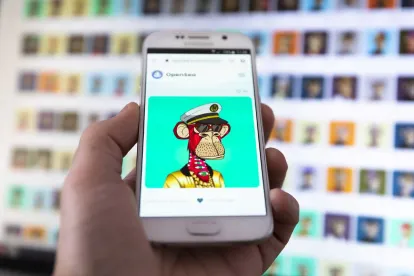Collins Dictionary’s 2021 word of the year was “NFT,” the acronym for “non-fungible token.” NFTs are digital tokens that are stored on a blockchain (most commonly, Ethereum). Today, most NFTs are digital collectibles and digital art. Much like keeping money in a bank account, NFT holders store their NFTs in a digital wallet — the most common digital wallet being “Metamask”, which can be used by downloading a browser extension or phone application — which connects to NFT marketplace websites where NFTs can be purchased and sold. The NFT holder can keep the NFT in the digital wallet, transfer it to another wallet (much like having multiple checking or savings accounts), or sell it to someone else, usually through an online marketplace (including the most widely used marketplace, OpenSea, which was recently valued at $13.3 billion). In the vein of famous artworks, some of the more valuable NFTs can even be pledged as collateral for a loan.
While NFTs may have started as digital collectibles, this is just the tip of the iceberg. NFT investment and business activity has surged over the last six to nine months. In February 2022, Andreessen Horowitz (A16z) announced that it is leading the funding round for an NFT project/brand, with a reported valuation of approximately $5 billion. Nike, Adidas, HSBC, Louis Vuitton, Instagram, Facebook, TikTok, and many other leading brands have also recently announced substantial NFT investments, projects, and initiatives. With growing use cases and unprecedented levels of VC and business investment, the future is clear: Some of the most valuable brands and IP in the coming years and decades will be digital and NFT-native.
Unlike the rights to “traditional” valuable IP — usually negotiated by attorneys and memorialized in a written licensing/assignment agreement — anyone can create (or “mint”) NFTs with the click of a button, without any contract, negotiations, or even basic information about the purchaser. This raises the question: What rights does an NFT holder have, if nothing is negotiated and the counterparties are unknown? Indeed, many NFTs do not have terms and conditions or spell out whether the purchaser acquires a personal license or commercial license. But even in those “clearer” cases where such rights are delineated, much remains unclear and ripe for dispute.
For context, NFT projects authorizing commercial use typically include language to the effect of: “Subject to your continued compliance with these Terms, [the creator/founder of the NFT project, whether Nike, an individual artist, etc.] grants you an unlimited, worldwide license to use, copy, and display the purchased Art for the purpose of creating derivative works based upon the Art. Examples of such Commercial Use would e.g. be the use of the Art to produce and sell merchandise products (T-Shirts etc.) displaying copies of the Art…” In contrast, NFT projects authorizing personal use (but not commercial use) typically include language to the effect of: “Subject to your continued compliance with these Terms, [the creator/founder of the NFT project] grants you a worldwide, royalty-free license to use, copy, and display the purchased Art, along with any extensions that you choose to create or use, solely for your own personal, non-commercial use.”
Let’s say the creator/founder sells an NFT to the initial purchaser, subject to a commercial and personal license. If the initial purchaser sells the same NFT to a subsequent purchaser, the subsequent purchaser may not have acquired the same rights as the initial purchaser (because the initial purchaser may not have the right to transfer the full panoply of rights). In such a situation, subsequent purchasers may find themselves having paid substantial money for essentially nothing. Adding further insult to injury, subsequent purchasers may not even know the identity of the creator/founder or the initial purchaser — as there may not be a way to ascertain the identity of the counterparty based on their wallet address (e.g., if seller’s digital wallet address is 0x1234 and purchaser’s digital wallet address is 0x2345, absent extensive on-chain analysis, it is unlikely that the purchaser would be able to determine the name or any contact information for the seller, who would be identified only as “0x1234”). As such, if a purchaser spends thousands of dollars on an NFT to use the image in the NFT to develop an apparel line, and the purchaser later learns that it cannot commercially exploit the image, the purchaser may not have recourse against the seller.
Further, often times, the terms and conditions of an NFT project are published on the NFT project’s website (e.g., if Nike created an NFT project, then Nike would likely post the terms and conditions on its website), but might not be published on the website of the third party marketplace (tantamount to Amazon or eBay) where the sales transaction occurs, and might not be embedded into the digital transaction whereby the purchaser acquires the NFT and the seller transfers the NFT. Aggrieved purchasers unaware of unfavorable or prohibitive terms in such instances will likely be looking for legal counsel to seek to rescind transactions, or assert claims for failure to disclose. Will the creator be able to disclaim liability on the grounds that the purchaser should have looked to the terms and conditions? Will the marketplace be able to disclaim liability on the grounds that it is just an intermediary? These issues, among many others, are certain to arise.
Licensing rights in the context of NFTs is becoming a key issue, and will surely be tested in courts and legislated in the years to come. While well-established infringement and related IP law may serve as helpful guidance, it cannot be transposed to this entire new system of digitally native IP. With the tremendous value creation, any IP attorney will need to be clued into these issues, which are sure to increase as the stakes grow.




 />i
/>i

